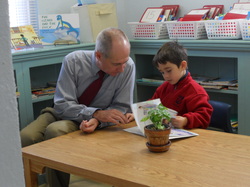
Now I have to admit to being more than a bit discouraged by the characterization of children with learning differences in this dispute. Although ostensibly calling for greater supports for them in schools, the underlying message was that they were an unwelcome presence in the classroom and interfered with the education of their peers. Government arguments that grouping students with specific learning needs together meant that resources could be concentrated fell on deaf ears and were characterized as a money-saving measure that was bad for kids.
Interestingly, if you accept the notion that the number of students with learning differences needs to be kept as low as possible in each classroom for it to operate effectively, then our school should represent the height of educational dysfunction - after all, every one of our classrooms is full of students with IEPs - the norm is, that there is no norm.
At KGMS and Maplewood Alternative, each of our classes is the most eclectic mix that you can imagine and our school functions quite wonderfully with over 160 different educational plans operating at the same time. Our teachers are masters of the art of running a truly student centered classroom, being aware of the range of learning styles and needs that they face and helping children and young adults navigate their way through the curriculum. Do they have supports? Of course they do. We have relatively small core classes (15-18) which are subdivided into working groups of five or six with a dedicated teacher for language arts and mathematics; we have specialist support teachers in Science, Social Studies, Phys-ed and the Arts; we have a strong counseling department which delivers our Social-Emotional Learning programme; we have psychologists, an SLP and an OT at our disposal; and a legion of expert tutors that provide close to an hour of one on one tutoring for each elementary student, every day and individualized academic support for all of our high school students.
You see, the real issue is not about who is in your classroom, but rather it is about how you are organized to effectively serve them. In our school, students with complex learning needs are not a challenge to be faced, they are a puzzle to be solved. We work as a team to unlock the barriers to their learning and open up new pathways to success. It is often a difficult task, but it is always rewarding.
Ironically, the greatest evidence of our success with our students is the fact that they eventually leave us! Most stay for two or three years and, having mastered the intricacies of the their own learning styles, they transition back out to mainstream schools and continue on their educational journey with the tool-kit that they have built with us.
There are a lot of misconceptions surrounding students with different learning needs and nowhere were they more evident than in some of the comments being thrown around in the mainstream and social media during the recent strike. I was reminded of this fact recently when touring around a visitor to our school. She asked whether or not we had any students on the autism spectrum. I replied that we had at least a dozen, perhaps more. Her response was surprise - after all, she said, it was so quiet around the school and it was her understanding the students with ASD would be shouting and making quite a disruption.
We still have a long way to go to demystify the needs and characteristics of students with learning differences but it is essential, if we are to have productive discussions on how we can best organize our schools to accommodate all learners.


 RSS Feed
RSS Feed
